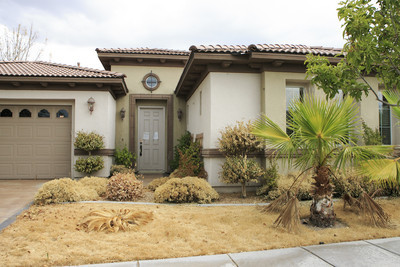Subcommittee targets housing sector
As Nevada slogs through a struggling housing market, a state legislative subcommittee wants to prevent future troubles in Nevada's housing market.
The Legislative Commission's Subcommittee to Study Mortgage Lending and Housing Issues met for four hours Monday inside the Grant Sawyer State Office Building near downtown to hammer out details on housing-related laws governing areas ranging from fines for illegal real estate practices to protections for renters.
The proposed laws won't help consumers in trouble today; they're simply suggested bills that the subcommittee will submit to the Nevada Legislature to consider when it meets from February to June.
The hearing room filled up for the meeting, with the audience of more than 100 beating previous attendance by three times or so, noted subcommittee Chairman and Assemblyman Marcus Conklin, D-Las Vegas.
The crowd listened quietly, with the exception of some applause when subcommittee member and Nevada Sen. Mike Schneider, D-Las Vegas, called for the panel to urge Congress to investigate the Wall Street investment banks he blamed for the nationwide rise in foreclosures.
To help change the market dynamics behind the ongoing wave of mortgage defaults, lawmakers plan to propose an array of bills.
On the 2009 legislative agenda will be laws that increase the maximum fine for escrow agency violations from $500 to $10,000; require mortgage brokers to post bonds or carry liability insurance; demand Nevada licenses or registration for out-of-state mortgage servicers; establish a victims' fund for consumers "victimized" by mortgage lenders, brokers or agents, similar to existing recovery funds for Nevada contractors and real estate licensees; establish that a mortgage broker has a fiduciary duty to a client; and give the state Division of Mortgage Lending the authority to order its licensees to pay restitution to consumers.
Monday's proposals featured several protections for renters living in homes with delinquent mortgages.
Bills would require landlords to tell potential tenants if the property for rent has a notice of default against it. Homeowners would also have to post a notice of default and a notice of sale at the affected property, and they'd have to display that notice on-site as long as the foreclosure process was pending. The subcommittee will also advocate legislation allowing tenants to break leases on homes with a notice of sale issued, as well as a law that would require 60 days' notice before a long-term tenant is evicted from a foreclosure property.
The subcommittee plans to pose a law that would require notices of default and sale to go to licensing authorities in foreclosure cases involving licensed medical centers or centers for dependent citizens. The subcommittee designed the measure to address homes converted to medical-care clinics, such as the Henderson property that served as a geriatric-care home for six seniors. The ailing residents had one day to find temporary housing after a judge ordered evictions for the foreclosed home's residents in 2007.
Affordable housing appeared on the subcommittee's agenda as well.
The group will submit a bill creating community land trusts to find and acquire property for affordable housing. It will also put forth a law that would use funds from the state's Account for Low-Income Housing to form a central repository for Nevada housing data. Without the repository, Conklin said, Nevada misses out on federal dollars for affordable housing, because officials can't inventory existing housing supplies and prices according to federal guidelines.
A proposal that would require banks that took title after a foreclosure sale to maintain a vacant home's exterior, including the landscaping and pool, proved the day's most controversial suggestion.
Schneider, who proposed the law, said banks must take responsibility for homes that stand empty thanks to questionable mortgages they issued.
"It's private industry that took the risk and made the loan," Schneider said. "We just keep bailing out the banks. I don't think we ought to bail them out on this. We need stringent laws that say the banks need to step up and take care of our neighborhoods."
But Nevada Sen. Warren Hardy, R-Las Vegas, argued that existing city ordinances against neighborhood blight made Schneider's proposal unnecessary. Nevada Sen. Bob Beers, R-Las Vegas, added that homeowners associations already have codes, covenants and restrictions they can enforce to ensure owners maintain homes. Schneider's idea won't be drafted as its own law.
Also scratched: a law that would require disclosure of the amount and source of all compensation brokers earn from a transaction, and a bill that would require a lender to "make a diligent effort" to contact an owner-occupant at least 30 days before filing a notice of default. Detractors said the laws replicated other proposals or existing practices, and both would be difficult to enforce.
In addition to Beers, Conklin, Hardy and Schneider, Assemblyman Tom Grady, R-Yerington, and Assemblywoman Marilyn Kirkpatrick, D-North Las Vegas, serve on the subcommittee.
Contact reporter Jennifer Robison at jrobison@reviewjournal.com or 702-380-4512.

















